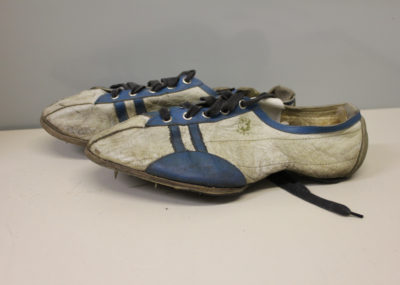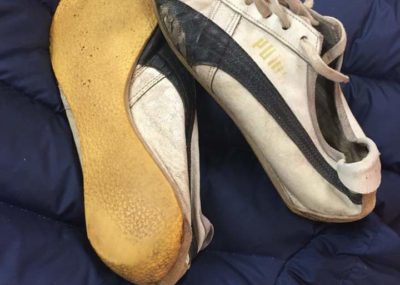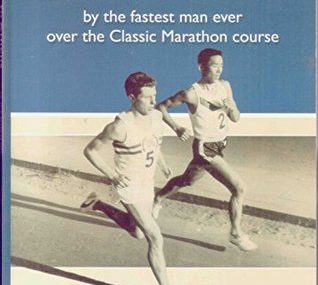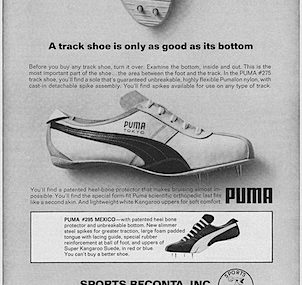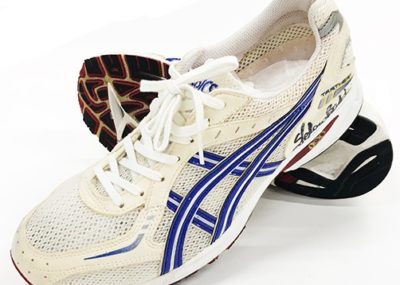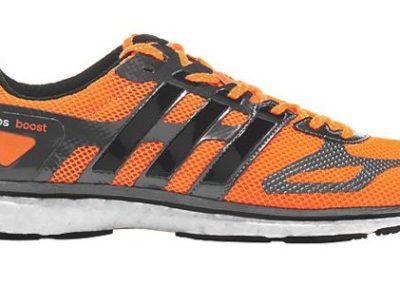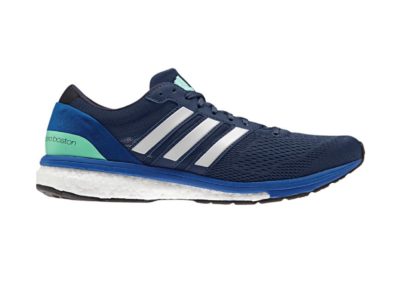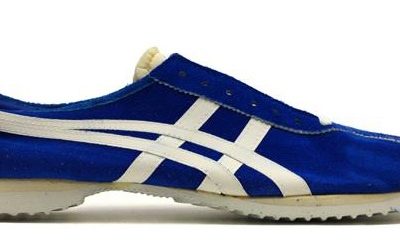6-Jul-1963 – Port Talbot Marathon – 2:14:43 – Hirvi racing flat
Date of birth: 26-Feb-1938
Nationality: English
The athlete:
Brian Kilby apparently failed his medical exam to join the military in 1959. Clearly undeterred, he would enter the 1960 Polytechnic Marathon and come second in his debut. He proceeded to win the Amateur Athletic Association of England (AAA) Championship marathon, and qualified for the 1960 Olympics. It was no surprise to Kilby, who was one of the first distance runners to train twice daily.
He would go on to win the next four AAA Championships, and in hot conditions sealed the 1962 European Championships, over one minute ahead of his nearest rival. Late in the year he would take the start of the marathon at the 1962 Commonwealth Games. After 10 miles he took the lead, and never relinquished it.
Little information is available about his next great performance other than it was particularly cold and wet, where he ran what was then the second fastest marathon ever at the Port Talbot Marathon in Wales. Given his streak of AAA Championships, it was no surprise that Kilby would again make selection for the Olympics. While competitive, he would just miss out on the podium in 4th position.
Taking his final AAA Championship in 1964, Kilby would have one last attempt at the Commonwealth Games in 1966, but unfortunately would not finish. He would eventually retire in 1969. You may, despite his many achievements, be wondering why Kilby appears on this list.
It is because the Association of Road Racing Statisticians (ARRS) is of the view that the Polytechnic Marathon course was the incorrect length, including for all the marathon world records set there during the sixties. There is one contemporary article from The Times that suggests the course may have actually been long. When researching the shoes Kilby wore, I was put in touch with the legendary Bill Adcocks.
More on that later, but it’s important to note that Adcocks was a contemporary of Kilby, and raced in the Polytechnic Marathon himself. He never heard of any rumours that the course was the incorrect length. It should be noted that the Polytechnic Marathon was the first marathon to be run at the standard of 26.2 miles.
While measurement standards aren’t what they are today, I would think if the course was long that would even further reinforce the achievements of those who set their times there. So although Kilby is an incredibly accomplished athlete, I’m unsure whether he held the marathon world record.
The shoes:
Now as for his shoes, they initially defied identification. We unfortunately have no pictures from the event in Wales, but we do have pictures from both the 1963 Boston Marathon, held less than two months before the Port Talbot Marathon, and from the 1962 Commonwealth Games. Both show a mysterious shoe with two stripes down the side. Thanks to the magic of the internet, I was put in touch with none other than Bill Adcocks who was of enormous help.
Arguably Adcocks’ greatest achievement is setting a course record at the Olympic Day Marathon, now known as the Athens Classic Marathon. It lasted from 1969 until the 2004 Olympics, an incredible 35 years, 4 months and 24 days. It wasn’t that later events lacked quality competition. Men like Kenji Kimihara, Mamo Wolde, Ron Hill, Ian Thompson, Gerard Nijboer, Jim Alder, Douglas Wakiihuri, Abel Anton, Martin Fiz, Steve Moneghetti and Rodolfo Gomez all competed on the course either with Adcocks or later. Between them multiple world records, Olympic medals, Commonwealth medals, world championships, and wins at the world’s most prestigious marathons. None could run faster than 2:11:07.
Apart from Stefano Baldini who won in 2:10:55 at the 2004 Olympics, with his specially tailored ASICS Tarther Japan shoes, only two other men have run faster since. Felix Kandie, who won the 2014 event in 2:10:37 wearing the Adidas AdiZero Adios Boost, and Brimin Kipkorir, who won the 2018 event in 2:10:56 wearing the Adidas AdiZero Boston 6. It is also important to note that these men all competed on the same course that hosted the 1896 Olympic marathon, which itself was based on the legend of Pheidippides.
It was said that following Greek victory at the Battle of Marathon, he ran all the way back to Athens to announce it, dropping dead after the words left his lips. As for Adcocks, it was hardly his only major achievement. He had already won the AAA Championship in 1965, silver at the 1966 Commonwealth Games, and the 1968 Fukuoka Marathon. You can read more about his storied career in his book The Road to Athens. While it is out of print, copies come up if you look hard enough.
As for the shoes that Kilby wore, Adcocks was in the same running club, the Coventry Godiva Harriers. Accordingly, he was able to confirm with some authority that Kilby wore racing flats by Finnish brand Hirvi. Hirvi was founded in the 50s before being taken over in the 60s by renowned Finnish runner Olavi Salsola. Hirvi shoes made their way to the United Kingdom through one Walter Ross, who had moved into promotions since his athletics heyday. Apparently athletes would come across the country to buy Hirvis from him.
Unfortunately I have no details on the model of the shoe itself, but thanks to the Sports Museum of Finland we have a picture of some Hirvi track spikes from the same period. You can see they have almost the exact same overlays as what Kilby wore in the 1962 Commonwealth Games. Hirvi sadly doesn’t exist anymore, and they were quite rare outside of Finland to begin with. If you want to see a pair, you’re probably best off visiting a museum.
As for Adcocks, it was Puma who agreed to provide him with racing flats after Adidas said they had no more to give. Adcocks advised me that the pair he wore in 1969 were based on elements of Puma’s then-latest track spikes. He later confirmed the image attached here shows one of the pair’s he wore at the time. You can see how closely they resemble the Puma track spikes of the era, complete with the leather strip reinforcing the midfoot.
Interestingly, when Adcocks was invited to Japan to compete in the 1970 Lake Biwa Marathon, Onitsuka Tiger representatives visited him at this hotel to offer him new shoes for the race. Adcocks was wary of the proposition given there would be little time to break them in, but allowed them to take measurements. They came back two days later with blue suede running flats.
Adcocks tried them on and was immediately impressed, particularly at how the shoes fit to his feet. Although he had initially fierce competition from Yoshiaki Unetani, after 30 kilometres Adcocks was alone at the front. He would comfortably win in a time of 2:13:46. As for the shoes, Onitsuka Tiger wanted to call them The Adock. After Adcocks advised that this might risk his amateur status they relented and apparently named them the Biwako.
I say apparently as I’ve been unable to find any reference to the Biwako model. I believe that Adcocks was instead referring to the Onitsuka Tiger Bangkok model, that was effectively the Marathon racing flat but in handsome blue suede. They were made from the late sixties until the early seventies, and Onitsuka Tiger like many shoe companies at the time made tailored versions for athletes of Adcocks’ calibre.
References:
The Road to Athens by Bill Adcocks
https://en.wikipedia.org/wiki/Brian_Kilby
https://www.birminghamccleague.co.uk/index.php/6-history/history/29-brian-kilby
https://www.nytimes.com/2001/07/30/sports/olympics-in-his-heroes-footsteps.html
https://germanroadraces.de/?post_eng=athens-classic-marathon-30th-anniversary-a-brief-history-summary-profile
http://oldposter.sneakerlab.net/puma/puma-275-tokyo-295-mexico-20160208.html
http://oldposter.sneakerlab.net/puma/puma-ts-200-225-202-track-shoes-puma-makes-the-shoe-for-runners-who-make-the-records.html
https://corp.asics.com/en/about_asics/history
https://www.stefanobaldini.net/index.php/notizie/13842-riprovando-le-asics-special-di-atene-2004-la-mia-review
https://germanroadraces.de/?post_eng=2500-years-marathon-the-home-of-the-marathon-by-david-e-martinphd-facsm-atfs-aims-in-distance-running
https://www.overkillblog.com/2017/08/01/kenny-moore-der-mann-hinter-dem-nike-cortez/
https://www.historyextra.com/period/ancient-greece/pheidippides-marathon-runner-battle-athens-persia-sparta/
https://encore.slwa.wa.gov.au/iii/encore/record/C__Rb2377623__Sbrian%20kilby__Orightresult__U__X6?lang=eng
